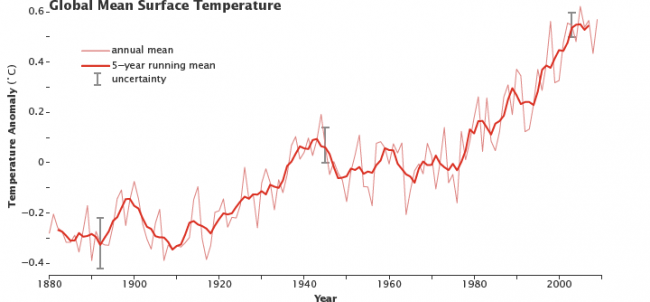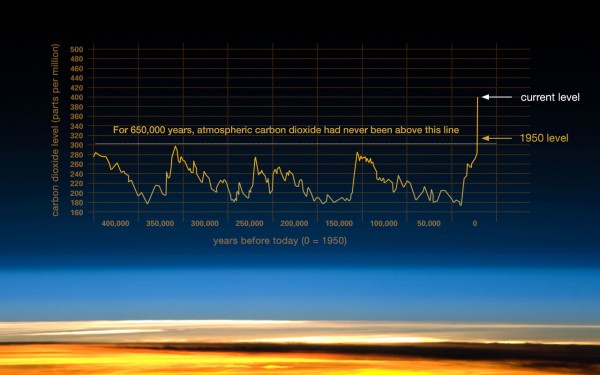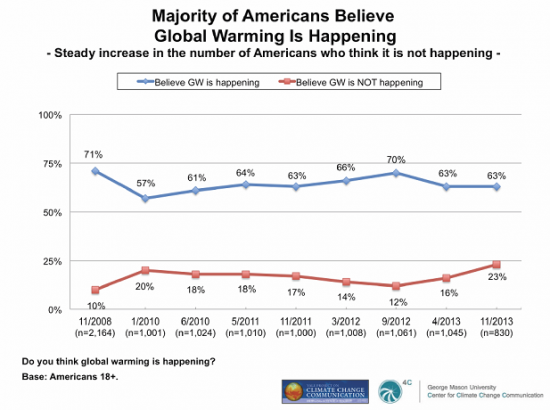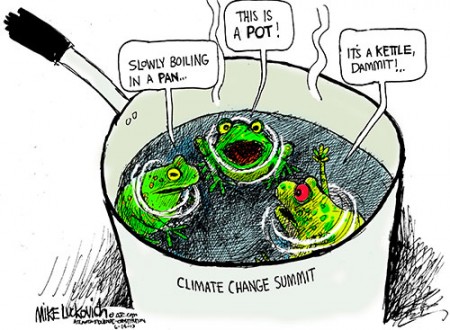November 25, 2015 – Yesterday while walking my dog I entered into a conversation with a neighbour on the subject of climate change. He began by stating, “Do you really believe it’s real?” I began by listing the enormous amount of scientific evidence accumulated over the last four decades. I talked to him about the physics and chemistry of the atmosphere and how larger accumulations of carbon dioxide convert photons of sunlight into radiative heat accounting for the upward curve of plotted mean average temperatures over several decades (see the two NASA produced graphs below and note the correlation between CO2 increases and rising temperatures). I talked about the record keeping of the reinsurance industry in its payouts for extreme weather events and how the number has exponentially grown over 60 years. It was like talking to a wall.
He pointed to the geologic record of the planet as refutation for all of the above. As we departed each others company it occurred to me that cognitive dissonance was at work, that belief was triumphant over evidence. And then today I read Carolyn Gregoire’s November 23rd piece, “Why Some Conservatives Can’t Accept That Climate Change is Real” and found within it the answer to the frustration I felt after walking away from that conversation.
Gregoire points out that 97% or more of climate scientists see climate change as linked to human causes. The quoted number is derived from studies appearing in peer-reviewed scientific journals. A 2013 analysis of peer-reviewed literature references 11,944 journal contributions with not 3% but 0.3% expressing uncertainty about the causes of global warming and with none denying that warming isn’t happening.
Here’s the kicker. Despite all this overwhelming peer-reviewed evidence, 56% of Republicans in the U.S. Congress today deny that what is being observed has human origins. Donald Trump, the billionaire aspirant to the Republican Presidential nomination states, “I am not a believer…..I believe there’s weather.” And he’s not alone in his beliefs. Most of the Republican field is packed with climate change deniers.
Why are leaders like Trump in denial? University of Victoria environmental psychologist, Dr. Robert Gifford, states, “nobody wants to be wrong, and that elicits confirmation bias.” In other words we ignore the science and seek information that supports our beliefs. It may be that our work makes it inconvenient to believe in global warming and so we then ignore evidence. Or it may be that we are uncomfortable with the “facts” and seek answers that make us feel comfortable.
Gregoire also points out an abiding distrust of experts today. If you have ever read Sherry Seethaler’s book, “Lies, Damned Lies and Science,” you understand why the public is often confused by the evidence. After all the tobacco industry used skewed science to support the cigarette industry for many decades despite the cancer link. In her preface to the book, Seethaler quotes Cardinal Wolsey who in the sixteenth century observed, “be very, very careful what you put into that head, because you will never, ever get it out.”
Whether faith or science, discredence, the distrust of experts, abounds in American society today. Back in January of 2014, an article in Mother Jones showed polling results from a Yale and George Mason University study on people’s beliefs about climate change. To the surprise of the researchers the number of people denying climate change (see the red line in the graph below) in the United States was on the increase. And for those who did believe global warming was real, an increasing number denied it had human origins.
As for cognitive dissonance, the discomfort experienced when confronted with evidence that contradicts belief, it appears that most seek refuge in finding the obscure to support belief over reason. Environmental sociologist at Michigan State University, Dr. Aaron McCright, states “a single exposure to a denial message significantly reduces subjects’ belief in and concern about climate change.” So if a U.S. congressional representative or a Donald Trump says “I don’t believe,” or questions the validity of the science, the opinions carry more weight than all the peer-reviewed journal articles on the subject.
Telling it straight there is no doubt that climate denial is a social phenomenon. It has no basis in science. And disbelief is widespread. So one wonders in the run up to COP 21 in Paris, where the nations of the world are congregating to come up with a global plan to combat climate change, just how committed is the American public or other nations’ populations to seeing carbon reductions through to the end? My guess is that the next “authority” to question the science will just make it easier for the public to not commit to action, moving the low-carbon goal posts even further away, and making it harder for generations that follow to cope with a world they inherit from their cognitively dissonant ancestors.













There is no unique concept about what Climate Change is.
I’m not clear on what your arguing for in this statement. “Unique concept’ is not a part of the discussion. The point of the article is the abiding lack of trust in science that appears to abound in much of American society.
If there is no unique concept then no discussion makes sense.
Your fixation on unique concept appears polemical. Anthropogenic climate change is a science based hypothesis supported by massive amounts of observable data. The data has been collected from the late 19th century to the present. The proliferation of data points is a more recent phenomenon beginning in the 1970s. At the same time computer simulation and modelling has given us the means to project trends and the models over the last three decades are convincing. What unique concept has to do with the original intent of my posting is beyond my understanding. If you are convinced that anthropogenic climate change is a hoax then maybe you need to argue in this manner. But unique concept has nothing to do with scientific evidence to support a hypothesis.
Wrong. Only unique concept allows scientific analysis.
I’m an economic conservative and social liberal. I’m a big fan of science and not much of a fan of “belief” systems interfering with my life. But I’m a climate change denier.
Why?
Because of science.
Huh?
Science is, primarily, about doubt. Science is useful in destroying the commonly-known but absolutely wrong notions we have about life, the universe, and everything. Science tells you that when “everybody” or “all” is used in a sentence, you’re about to hear some utter bullshit. Science tells you that common knowledge is so common, and usually wrong. Everybody once knew that the world was flat, that the sun revolved around it, and that God created it in seven days.
Everybody knows that man has changed the Earth and warmed it.
Well let’s think about it. What is our evidence? It is a database of temperature readings. That database is controlled by two small groups of scientists, one American (NOAA) and the other British. A database needs “control” because in compiling statistics, there are methods required to ensure the statistics don’t lie. Some of these methods include throwing data out, correcting data, and interpolating between diverse sources of data. A sum total of about 12 people on this planet are in charge of this process.
And their jobs and professional reputations are on the line.
We already know that NOAA has modified the dataset in ways that support the political hypothesis. And we already know the Brits fabricated data from whole cloth and covered it up until discovered via an email breach. And the Brits even said WHY they did it! To preserve their particular version of a status quo.
But aside from these shenanigans, my view is that the worst problem in climate science is the interpolation of data between the older and newer datasets. The older ones were taken in hundreds of locations, post offices, train stations, and city halls across America (and elsewhere in the world). These were recorded by well-meaning postmen, stationmasters, and clerks … in pencil … in a book.
The new datasets are taken in literally BILLIONS of locations at EVERY point across the globe by impersonal satellites at all hours of the day or night and recorded directly to computer databases.
Given that Climate Science claims a less than one-half of one degree celsius rise in temperatures over the last 150 years … is there NO POSSIBLE WAY that the interpolative procedures are the cause of such a result? Well, scientists have actually been debating that particular problem … in academic papers … and are STILL debating that problem … in academic papers … and there’s no clear answer.
So, even though I recycle (my recycle can is always more than twice as full as my garbage); and we have efficient cars, furnaces, and lighting (almost all LED!); and even though I am an avid outdoorsman who supports environmental and nature causes; and though I eat probably 70% organic in my household and use all the most eco-friendly products throughout … and I wear Birkenstocks … I am a Climate Change Denier.
Science is the religion of DOUBT. And I DOUBT that these guys have settled the issues with their database in sufficient fashion to make broad descriptions or prescriptions about the environment. And until they can give a non-cagey, non-political, non-self-serving answer about INTERPOLATION, I will remain a climate change denier … even though my natural tendency is to go along with scientists … I cannot do so in this case because THE EMPEROR HAS NO CLOTHES.